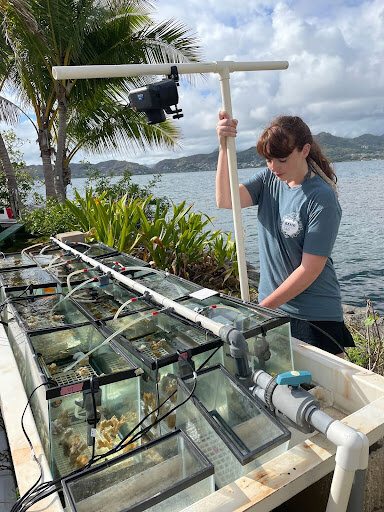
News
Special Feature: Young voices and visions for the UN Decade on Ecosystem Restoration
Seascape Lab member Courtney Stuart and fellow Geography PhD students share their leadership roles in the upcoming Restoration Ecology Special Feature.
Fieldwork Tales: Studying tropical land-sea connections
In July 2022, the Oxford team set out to collect ecological data for a long-term project supported by the Bertarelli Foundation and led by Prof Nick Graham, Lancaster University.
Diving into the Reef Conservation UK Conference
The Oxford Seascape Ecology Lab headed to the annual Reef Conservation UK conference at ZSL, London, to present our latest work on reef ecology and restoration.
npj Ocean Sustainability: Pathways to ‘a sustainable ocean for all’
The Oxford Seascape Ecology Lab is excited to share the first issue of a new interdisciplinary journal, npj Ocean Sustainability, and encourage new submissions.
A pathway for policymakers to account for multiple interacting stressors in ocean management decisions
A collaborative project between the University of Oxford School of Geography and the Environment and the Stanford Center for Ocean Solutions has recently published a framework for integrating scientific understanding of multiple interacting stressors into decision-making processes.
Kurt Jackson and the Oxford Seascape Ecology Lab: Biodiversity exhibition
The Oxford Seascape Ecology Lab joins British artist Kurt Jackson for an innovative exhibition at the Oxford University Museum of Natural History.
COP26: Safeguarding Our Coastlines and Our Climate
Oxford Seascape Ecology Lab visits the COP26 Virtual Ocean Pavilion: Watch our blue carbon science videographic now!
Coupling Art and Science to Communicate the Importance of Coastal Blue Carbon: the ABC Network
The Oxford Seascape Ecology Lab explores new ways to create engagement with blue carbon science through several art-science partnerships and interactive outreach activities.
Exploring Advances in Seascape Ecology at the 2022 Ocean Sciences Meeting
Dr Lisa Wedding and Dr Simon Pittman of the Oxford Seascape Ecology Lab are organising a Scientific Session for the upcoming Ocean Sciences Meeting, a “global leader” in ocean sciences conferences, that is now open for abstract submission.
Reefs and Resilience in Hawai'i
Situated in Kāne‘ohe Bay, Hawai'i, Oxford Seascape Ecology lab member Lauren Neville conducted the first-stage of her doctoral fieldwork on Coconut Island this past month.
Mapping land cover change to inform coral reef management
Mapping the spatial patterns of land cover change in Puerto Rico to inform land-based conservation and coral reef management. Led by Pirta Palola.
Anthroposea Expedition
Coinciding with the UN Decade for Ocean Science for Sustainable Development and the recent #WorldOceansDay, the Anthroposea Expedition team set out for two weeks sailing the British coast to investigate human interactions with our oceans.
The Oxford Seascape Ecology Lab joins the Art, Biodiversity & Climate Network
The Lab is particularly excited to be announcing our latest partnership with the Art, Biodiversity and Climate Network.
Fishing, Brexit, and the Iconography of a Maritime Nation
The impact of fishing iconography on British politics is explored in this latest paper, “Splendid Isolation or Fish out of Water? Fishing, Brexit, and the Iconography of a Maritime Nation”, co-authored by Aadil Siddiqi.
New Study Incorporating Blue Carbon Science into Climate Policy Solutions
New research led by Dr Lisa Wedding, published in Global Environmental Change, investigates the carbon sequestration potential of habitats along the California coast and details pathways incorporating carbon-capturing habitats into climate change policy.
Research Priorities for Seascape Ecology
A recent study led by the Oxford Seascape Ecology Lab explores the future agenda for applied seascape ecology research.
Multiple interacting stressors in Arctic Ocean ecosystems
Recently published in Nature Communications, research led by Arrigo et al. (2020) found that neglecting stressor interactions led to vastly underestimated risk of animal population crashes, highlighting the necessity of accounting for stressor interactions in comprehensive environmental risk assessment and management planning.

















